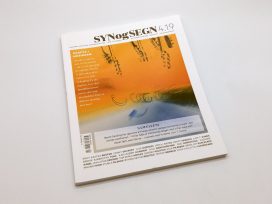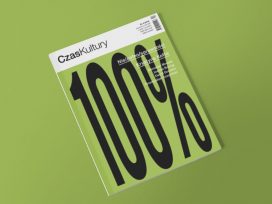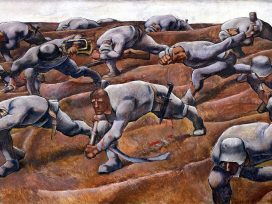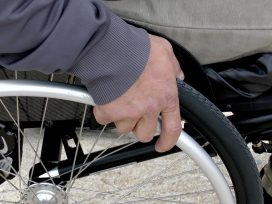Incapacity is usually imagined as bodily, which takes away from their broad nature, as they are often psychological, sensory, and mental as nicely. Whereas some are clearly seen to the attention, many stay hidden. However whether or not acquired or congenital, one factor stays true: disabilities have existed all through historical past. A rising pool of archeological proof, some relationship again tens of hundreds of years, present that amputees and folks residing with Down syndrome, to call some examples, have been built-in members of their societies throughout time.
Although a part of the human situation, self-determination continues to be unattainable for a lot of disabled folks. Eugenics as a motion favored to classify folks as both ‘fit’ or ‘unfit’ contributors to society. Primarily, it paved the best way for deeming folks as disposable, one thing which has been exploited time and time once more to justify colonialism and systemic oppression.
Throughout the Holocaust, an estimated 250,000 disabled folks have been murdered, and up till a number of many years in the past, institutionalisation and compelled sterilisations have been regular therapy throughout Europe.
The European Union at the moment ensures an entire set of rights for disabled folks, and has arrange initiatives such because the EU Incapacity Technique. Consciousness campaigns nevertheless don’t assure the enforcement of these rights. Maria Dinold states that whereas laws on inclusivity exist in concept, they’re but to be absolutely practised.
Disabled folks face a larger threat of poverty or social exclusion. In Bulgaria 52.3% of individuals with disabilities stay in socially dysfunctional conditions. Estonia, Latvia, Lithuania, and Croatia additionally file figures as much as 40.4%.
Ladies with disabilities face further challenges. Disabled Survivors Unite, a UK-based incapacity rights NGO, revealed that girls with disabilities within the UK are greater than twice as more likely to expertise violence and abuse than others. They’ve a tougher time discovering a job, and once they do, they have a tendency to earn much less, have fewer possibilities to check, and wrestle extra to get the healthcare they want.
Many stay in households the place work is scarce, particularly in international locations like Eire and Belgium. And even these with jobs, like in Romania, nonetheless face a excessive threat of poverty in comparison with their friends with out disabilities.
Medical wants are one other urgent concern. About 7% of girls and 6% of males with disabilities within the EU report unmet medical wants, with even larger ranges in some international locations. A mere 2.3% of senior official or managerial positions are held by ladies with disabilities.
Activists, self-advocates, NGOs and communities stay on the forefront of bettering this case, however there’s nonetheless lots of work to be completed. At present’s friends lead the cost on this uphill battle, and they don’t apologise for demanding truthful therapy.
Bernadette Feuerstein is an Austrian incapacity rights activist and public official, recognized for her vital contributions to incapacity rights. She has been enjoying an vital half within the Austrian incapacity motion, together with her involvement in making a barrier-free Austrian documentary on the subject.She can also be the chairwoman of Selbstbestimmt Leben Österreich (Self-Decided Residing Austria).
Walter Mathes is an actor, artwork therapist, and cartoonist. He’s a group employee and theatre coach and has labored with folks with particular wants, addictions, and in penitentiary services.
Maria Dinold works on the mixing of individuals with and with out disabilities into cultural life and to advertise social inclusion by creative exercise. Is a deputy chairperson of the Ich Bin O.Ok. Affiliation. She’s the President of each the Austrian department and the European Federation of Tailored Bodily Exercise.
We meet with them on the Alte Schmiede Kunstverein, Vienna.
Artistic crew
Réka Kinga Papp, editor-in-chief
Merve Akyel, artwork director
Szilvia Pintér, producer
Zsófia Gabriella Papp, govt producer
Margarita Lechner, writer-editor
Salma Shaka, writer-editor
Priyanka Hutschenreiter, undertaking assistant
Administration
Hermann Riessner, managing director
Judit Csikós, undertaking supervisor
Csilla Nagyné Kardos, workplace administration
OKTO Crew
Senad Hergić producer
Leah Hochedlinger video recording
Marlena Stolze video recording
Clemens Schmiedbauer video recording
Richard Brusek sound recording
Postproduction
Nóra Ruszkai, lead video editor
Kateryna Kuzmenko dialogue editor
Artwork
Victor Maria Lima, animation
Cornelia Frischauf, theme music
Captions and subtitles
Julia Sobota closed captions, Polish and French subtitles; language variations administration
Farah Ayyash Arabic subtitles
Mia Belén Soriano Spanish subtitles
Marta Ferdebar Croatian subtitles
Lídia Nádori German subtitles
Katalin Szlukovényi Hungarian subtitles
Daniela Univazo German subtitles
Olena Yermakova Ukrainian subtitles
Aida Yermekbayeva Russian subtitles
Mars Zaslavsky Italian subtitles
Hosted by
The Alte Schmiede Kunstverein, Vienna.
Sources
Sorts of disabilities, Aruma.
Seen vs. Invisible Disabilities: Extra Than Meets the Eye, 24 Hour Homecare.
Prehistoric little one’s amputation is oldest surgical procedure of its variety by McKenzie Prillaman, Nature.
Folks like us by Bryan Fanning, Eurozine.
Colonialism, eugenics and ‘race’ in Central and Japanese Europe by Marius Turda and Bolaji Balogun, Bristol College Press.
Infographic – Incapacity within the EU: info and figures. European Council
Folks with incapacity at larger threat of poverty or social exclusion, Eurostat.
Addressing the invisibility of girls and ladies with disabilities, Human Rights Remark, Council of Europe.
Incapacity statistics – poverty and earnings inequalities, Eurostat.
The scenario of girls with disabilities (exploratory opinion requested by the European Parliament) by Gunta Anca, European Financial and Social Committee.
Info and figures: Ladies and ladies with disabilities, UN Ladies.
Disclosure
This speak present is a Show Europe manufacturing: a ground-breaking media platform anchored in public values.
This programme is co-funded by the Artistic Europe Programme of the European Union and the European Cultural Basis.
Importantly, the views and opinions expressed listed below are these of the authors and audio system solely and don’t essentially mirror these of the European Union or the European Schooling and Tradition Government Company (EACEA). Neither the European Union nor the EACEA will be held accountable for them.









